What is the role of the chairperson? And does your board need one?
The role of a chairperson and when to appoint one.
This article will cover:
-
What is the role of the chairperson?
-
Does your board need to appoint a chair?
Article 12(1) of the Model Articles of Association merely says that the directors may appoint a director to chair their meetings, and there is nothing in the Companies Act that forces a private company to appoint a chair of the board. And yet it may be a good idea for a host of reasons.
-
What is the role of the chairperson?
The courts have considered the role of the chairperson on various occasions, and the consensus is that the main purpose of the chair is to make sure the directors’ meetings are conducted in an orderly fashion. For instance, it is the chair’s duty to check the meeting is quorate and to bring the discussion back to the meeting agenda if the directors get carried away.
The chairperson has a responsibility under common law to ensure that every director entitled to speak at the meeting gets the opportunity to do so, which in practice means allocating adequate time for discussion.
Further, the chair’s signature alone on the minutes of a board meeting is enough for those minutes to be recognised as proof of the proceedings at that meeting – this is specifically mentioned in the Companies Act.
Some additional guidance is available from the Chartered Governance Institute (ICSA). ICSA does not prescribe hard rules, but their recommendations are widely seen – and followed - as “best practice”. In their 2017 guidance note on minute-taking ICSA said, among other things, that the chairperson should have the last word in any dispute about the accuracy of draft minutes.
Otherwise, the chair’s powers and duties will be set out in the company’s articles. Model Articles, for example, allow the chair to decide whether a director’s vote counts when the director has a conflict of interest, and to resolve board deadlocks with the chair’s casting vote. If the chair is to have any specific powers or duties, those should be set out in the company’s articles. Equally, a company on Model Articles can amend the articles to add or remove rules regarding the role of the chair.
As for the remuneration payable to a director who is also the chairperson, this is a matter to be dealt with in the director’s service agreement.
2. Does your board need to appoint a chair?
The bottom line is that the company does not necessarily have to appoint a chair of the board, but it will probably want to. The chair is important to make sure the board of directors runs effectively.

Based on SeedLegals data for funding rounds under £200,000
What is common is for the chairperson of the board to be someone other than the CEO. And especially if you have a company with multiple founders - it’s often the case that one Founder will act as the CEO and is in charge of running the business, another can then act as Chair and is in control of running the board.
For more information see our articles: